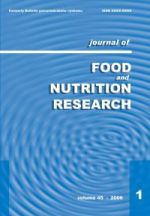Scientific journal
Journal of Food and Nutrition Research
Summary No. 1 / 2017
Donno, D. – Mellano, M. G. – Prgomet, Ž. – Cerutti, A. K. –
Phytochemical characterization and antioxidant activity evaluation of Mediterranean medlar fruit (Crataegus azarolus L.): Preliminary study of underutilized genetic resources as a potential source of health-promoting compound for food supplements
Journal of Food and Nutrition Research, 56, 2017, No. 1, s. 18-31
Dario Donno, Department of Agricultural, Forest and Food Sciences, University of Turin, Largo Braccini 2, 10095 - Grugliasco (TO), Italy. E-mail: dario.donno@unito.it
Received 12 July 2016; 1st revised 31 October 2016; accepted 28 November 2016; published online 27 January 2017
Summary: Azarole fruit (Mediterranean medlar, Crataegus azarolus L.) has attracted increasing attention in the field of functional foods because of its widely reported health benefits. The aim of this research was to describe overall quality traits of azarole fruit, report its antioxidant activity, and identify and quantify the levels of potentially bioactive compounds by chromatographic fingerprints. Different methods were used to determine concentrations of phytochemical compounds (phenolic and organic acids, flavonols, tannins, catechins, monoterpenes, vitamin C) in the fresh fruits. For the analysis, high performance liquid chromatography with diode-array detection was used. The same analytical methods were also applied to some common temperate fruit species grown in the same pedoclimatic conditions in order to understand if C. azarolus presents a real added phytochemical value compared with others. The chemical fingerprints showed the prevalence of organic acids (55.0%), followed by polyphenols (25.1%), monoterpenes (15.4%) and vitamins (4.5%) in the phytochemical composition of all the analysed samples (mean values were considered). This study developed an effective tool to assess azarole fruit quality, chemical composition and antioxidant activity. The results may support the exploitation of this fruit as a potential natural source of bioactive compounds in several applications.
Keywords: underutilized fruits; red azarole; bioactive compounds; chromatographic fingerprinting; phytochemical
Download:
(pdf, 506.83 Kb, 2191x)










